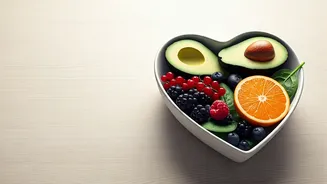Oatmeal's Heart-Healthy Power
Oatmeal is a breakfast staple renowned for its cholesterol-lowering abilities. The soluble fiber found in oats, specifically beta-glucan, works by binding
with cholesterol in the digestive system, preventing its absorption into the bloodstream. Consuming approximately 1.5 cups of cooked oatmeal daily can lead to a notable reduction in LDL cholesterol, often referred to as 'bad' cholesterol. This is because the beta-glucan fibers trap cholesterol, escorting it out of the body before it can be absorbed. Furthermore, oatmeal is rich in nutrients, including essential vitamins and minerals, making it a nutritious addition to any diet. Choosing whole-grain oats over processed varieties ensures you receive the maximum fiber and health benefits. By starting your day with oatmeal, you're taking a simple yet powerful step toward improved cardiovascular health. Make sure to combine oatmeal with fruits and nuts to enhance its benefits.
Embrace the Power of Nuts
Nuts are excellent additions to a cholesterol-lowering diet, offering both monounsaturated and polyunsaturated fats, which can help decrease LDL cholesterol levels. They also provide fiber, which aids in cholesterol management. The benefits of nuts are well-documented, with studies showing that incorporating nuts into your daily diet can significantly reduce the risk of heart disease. A handful of nuts (about 1.5 ounces) each day is a good amount. Walnuts, almonds, and pistachios are among the best choices, but variety is key to obtaining a wide range of nutrients. Remember that nuts are calorie-dense, so moderation is crucial to maintaining a healthy weight. Opting for raw or dry-roasted nuts is often the healthiest choice. By including nuts in your diet, you're not only improving your cholesterol profile but also gaining beneficial nutrients such as vitamin E and magnesium.
Soy-Based Food Benefits
Soy-based foods, such as tofu, edamame, and soy milk, have been shown to reduce LDL cholesterol levels. This is largely due to the isoflavones present in soy, which have a positive effect on blood vessels and cholesterol metabolism. Regular consumption of soy can lead to a noticeable decrease in LDL cholesterol, providing significant cardiovascular benefits. Soy foods are also a good source of protein, making them an excellent meat alternative, and are low in saturated fat, contributing to their heart-healthy profile. Incorporate soy into your diet by adding tofu to stir-fries, enjoying edamame as a snack, or drinking soy milk in your cereal. When choosing soy products, aim for minimally processed options to avoid added sugars and sodium. Soy not only helps in reducing bad cholesterol but also supports overall well-being by providing essential nutrients.
Fish and Omega-3s
Fatty fish, such as salmon, mackerel, and tuna, are rich in omega-3 fatty acids, which are vital for lowering triglyceride levels and raising HDL cholesterol (the 'good' cholesterol). Omega-3s have a significant impact on cardiovascular health, reducing the risk of heart disease and stroke. These fatty acids also help to reduce blood pressure and inflammation, both key factors in preventing heart problems. Aim to consume at least two servings of fatty fish per week to reap the benefits. Baking, grilling, or steaming fish are healthier cooking methods compared to frying, which can add unnecessary fats. Additionally, consider supplementing with fish oil if you do not consume enough fish, but always consult your doctor before starting any supplements. Including fatty fish in your diet offers a delicious and effective way to support your heart health.
Plant Sterols/Stanols
Foods containing plant sterols and stanols can effectively reduce LDL cholesterol by blocking its absorption in the intestines. These compounds are naturally found in plants and are added to various foods like yogurt, orange juice, and spreads to enhance their cholesterol-lowering effects. Consuming 2 grams of plant sterols or stanols daily can lead to a significant decrease in LDL cholesterol. These sterols and stanols work by competing with cholesterol for absorption, leading to a reduction in the amount of cholesterol that enters your bloodstream. You can incorporate these foods into your diet by choosing products fortified with plant sterols or stanols or by increasing your intake of foods naturally containing these compounds. Plant sterols and stanols are a practical and easy method to help you manage your cholesterol levels.














